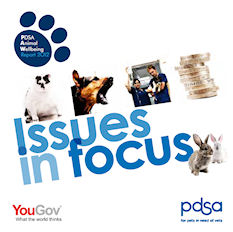PDSA PAW Report 2012 & Rabbits
 Okay, I know I said I’d talk about poop next, but the PDSA’s Animal Wellbeing (PAW) Report is out today, and I’m really excited to see what has changed since the 2011 PAW Report.
Okay, I know I said I’d talk about poop next, but the PDSA’s Animal Wellbeing (PAW) Report is out today, and I’m really excited to see what has changed since the 2011 PAW Report.
Let me set the scene, the PDSA is a big UK veterinary charity than runs free and discount clinics for pets whose owners are on benefits. One thing I love about the PDSA, as well as that they provide free vetcare to animals in need, is that they treat bunnies just as important as cats and dogs, so their report has lots of fascinating insights on their welfare.
Last year’s report looked at how well owners provided for the five needs outlined in the Animal Welfare Act: environment, diet, behaviour, social interaction and health. This year they focus on several key issues: diet, behaviour (specifically dogs), heath and pet ownership. The report is 68 pages long, and it’s an interesting read. I’m just going to pull out a few rabbit related facts but do download a copy to get the whole picture.
Diet
A bit of bad news here,
44% of rabbit owners continue to feed rabbit muesli as their rabbits’ main source of food. Many owners may think this is typical ‘rabbit food’, but may not be aware it is actually unsuitable for rabbits and linked to dental and digestive health problems.
There is obviously still a bit of education to do about the right and wrong kinds of rabbit food. I think I’m going to revamp the diet pages on my website and focus a bit more on the choices available. It’s tricky to get this message across as a lot of owners will just pick a colourful looking bag in a pet shop and assume it’s good and never do more research. I wonder at what point manufacturers will start phasing out their muesli lines in favour of pellets – I know some sell both and they must know pellets are better.
The good (ish) news:
Rabbits should eat at least their own body size in hay or grass each day but 36% don’t.
Why is this good news? Because last year the figure was 45%, which means in the last year there has been a big improvement in the number of rabbits getting enough hay or grass. Let’s hope this trend continues.
Health
Here the report looked at routine heath care such as neutering and vaccinations. The good news is that these figures were up for all animals, including rabbits.
| Rabbits | 2011 | 2012 |
| Vaccinated | 46% | 52% |
| Neutered | 37% | 47% |
| Microchipped | 3% | 7% |
| Insured | 6% | 9% |
The report also gave the top three reasons owners gave for not neutering/vaccinating…
Not Neutered Reasons:
- Haven’t thought about it
- Too expensive
- Worried about general anaesthetic
Not vaccinated Reasons:
- Not necessary
- Too expensive
- Haven’t thought about it
Still some educating to do here too, but in some ways that is good because if the reasons they give are things you can fix with education that means there is the opportunity for change. It sounds like we need to make people more aware that rabbits can be neutered and what benefits that brings, and also get rid of outdated misconceptions about anaesthetics. We also need to make people aware that vaccinations are necessary, many owners don’t realise this until their rabbit catches one of the fatal diseases they protect against.
Ownership
The PDSA estimates the lifetime cost of owning a rabbit is £9k but 81% estimated cost less than £1k. That’s quite a wide gap. Even ignoring unexpected vet bills, the cost of housing, food, bedding, vaccinations is easily over £1k across 10 years life expectancy. It’s not surprising so many animals are abandoned because people have trouble affording them.
The PDSA asked vets about their concerns as well as surveying pet owners. Vets say their concerns general pet ownership are:
- owners not understanding costs
- lack of information at purchase
- lack of awareness of the five needs outlined in the duty of care
For rabbits specifically, their concerns were:
- inappropriate diet
- dental disease
- inadequate space for exercise
It sounds like diet all around is quite an important issue, which isn’t surprising when you consider how important food is to rabbits!
Conclusion
So what does this all mean? Well there are signs that education messages are getting through, but there are still many areas that need a lot more work. The great thing about quantifying the issues is you can tell when things improve so get out there and get educating and hopefully the 2013 report will be even better!
Tags: paw, rabbit-welfare


We have the same issues here in the states, except for the vaccinations. The Myxo here is isolated and spread out, but we counsel people to keep thier rabbits indoors for that and a slew of other reasons. I think here our twice monthly adoption and education shows help get the word out. It’s like a miracle when someone comes in with a rabbit they were given and is living in a hutch, goes away with lots of info. Then returns to say they had the rabbit neutered, he has his own room when they are gone, run of the house when they are home and they’d like a friend for him. Yes, it really happened.
I agree with you about diet, so crucial !
I have kept rabbits when I was a child, in a large chicken coop (I could easily sit in their bedroom area with them and the door to the run was big enough for adults to go in standing up). Never thought about neutering them or vaccinations. Recently bought two dwarf rabbits (impulse from a pet shop…) and will certainly consider neutering them (2 sisters). They have a 150cm x 25cm indoor cage in my bedroom which they come out of twice a day for a run around (luckily rabbit wee washes off from the duvet cover and I now put a thick blanket over it) and a 190 x 73 cm chicken run in our dining room where I can watch them all day long! In the spring I intend to create an outdoor exercise area for them. They are ever so friendly (well handled in the pet shop, with staff supervision) and seem to be perfectly contented. Its great to see them cuddling up together and amazing how fast they run, how high they jump and how much ground they cover!
It’s amazing how we keep animals changes over time, I don’t think we notice in the short term but go back ten or twenty years and the knowledge and advice has changed massively. It sounds like your childhood rabbits were very lucky though, as they had a lovely big space. I see some of the the little hutches still for sale now and wonder how the rabbits fit in, let alone run and jump – which as you say is amazing to watch!
You may find neutering will help with the litter training which often gets worse as they mature, you don’t notice so much with outdoor bunnies. Vaccination is really important (UK) as myxi seems rife now in the summers and it spreads to pet bunnies very easily.
I really enjoyed reading the articles on your website, I found them very insiteful. I have two bunnies, a male and a female. Both neutered over a year ago and I want to share how that changed everything! My female : Sandy, I bought from a breeder very young. She was was fun and easy going until she hit adolescence…she was using her litters but not all the time and she became aggressively lovable with my male ( rocky). I bought rocky from a shelter, he was neutered just before I brought him home. I thought with one bunny neutered, there would be no reason to get Sandy neutered…I was soooo wrong! Their introduction was relatively simple, he had been neglected and was very happy to meet Sandy. Sandy happily accepted Rocky after she established that she was boss. I am no expert, and although I try to be well informed, I didn’t didn’t fully understand the implications of NOT neutering Sandy. About two months into the relationship, I notice that Sandy was relentlessly after Rocky to make whoopi. she was about seven months old, she had also become more difficult in general including the litter training but I was told that adolescence would be a difficult time….until she seriously bit Rocky! I understood that things could not continue like this. She was neutered and they were separated during their respective recovery period. I worried that they may never be friends again but I am happy to report that a neutered bunny is a much happier bunny! she loves and cares for Rocky as he returns his love for her…much less whoopi going on, and the litters are respected! Nothing is perfect, but I discovered that Sandy is a bundle of joy, not a wild bully! I hope this helps those who think that neutering is only for controlling baby production as I once believed.
Thanks very much for sharing your experience I hope it inspires others reading to go ahead and neuter. It’s quite amazing how much influence hormones have on bunnies behaviour – particularly girls. I’m so glad you got a happy ending with two loved up bunnies that you can enjoy spending time with.
Maybe you can help me. I was petting my lttile girl today when I noticed her teeth. Her? top teeth are BEHIND her bottom teeth (and she has a tiny chip missing from her bottom one). Aren’t they supposed to be in front? She is 7 weeks old and has always had access to chew toys, hay and pellets. D: I’m really worried. Is this normal(-ish?)? or should I be doing something?
Sorry, I missed this when you originally posted. It sounds like they might not line up quite right – a vet would be able to tell you more accurately. Keep a close eye on them because if they don’t wear correctly they can overgrow and the vet will need to file them down. Plenty of hay will help keep them in good condition.